Chicago Actor and Director Partner on Profound One-Woman Show at Augustana College
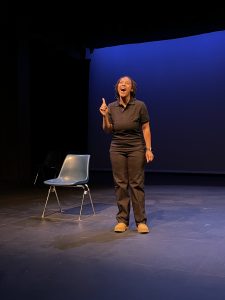
Jalyn Greene rehearsing for “No Child…” at Brunner Theatre, Rock Island.
Sydney Chatman and Jalyn Greene know what it’s like to teach theater to minority, inner-city students.
So the African-American women are a natural pair to direct and act, respectively, the one-woman show “No Child…,” which is the last Mississippi Bend Players production this summer. It runs Thursday through Sunday at Augustana College’s Brunner Theatre Center, 3750 7th Ave., Rock Island.
“No Child…” (written and premiered in 2006 by Nilaja Sun) follows the story of Miss Sun, a visiting teacher who uses theatre as a means of connecting with students in the New York City public school system. This one-person play, based on the playwright’s own experiences, is a tour-de-force as the actor plays 16 different characters in rapid succession, including Miss Sun, her students, other teachers and administrators, and even the school’s 80-year-old janitor.
“An insightful, hilarious, and touching master class not to be missed by anyone concerned about the state of the education system and how it might be improved,” according to MBP.
Jalyn Greene is a 28-year-old an actor, poet, and teaching artist. Detroit born and Chicago based, she received her BFA from Michigan State University. Recent acting credits include “Queen of Sock Pairing” as The Narrator (Red Tape Theatre), “We Are Pussy Riot” as Masha (Red Tape Theatre), “How to Pick a Lock” as Zhara (Rhinofest), “The Dark at the Top of the Stairs” as Cora Flood (understudy) (Eclipse Theatre), and “Breathe, Boom” as Angel (Eclipse Theatre). Greene thrives on the belief that arts education is key in creating compassionate, bold, and effective leaders.
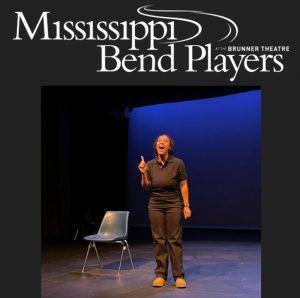
Mississippi Bend Players is a professional summer stock company based at Brunner Theatre Center at Augustana College.
Greene has partnered with Chicago theatres and youth arts organizations such as Lifeline Theatre, Emerald City Theatre and Pegasus Theatre, providing arts programming to hundreds of students across Chicagoland, with an emphasis on communities with large minority and immigrant populations.
Coming from Detroit, arts were cut in schools, but Greene had an influx of visiting artists and creative programs in her community.
“If I didn’t have those opportunities to explore all these different kinds of art and creative outlets, I wouldn’t have broadened my horizons. Like, the whole thing about storytelling, the whole thing about art is that it’s supposed to make sure that it’s supposed to teach us about other people,” she said. “The whole thing about acting is to have the empathy and have the compassion, to be compassionate and be authentic enough to accurately portray other people. And so that comes with a sense of empathy.”
Whether you’re an actor or audience member, learning about different people boots your compassion for others, Greene said. “I just think that more than anything, art makes us more sympathetic and forces us to reflect on ourselves. And I think that’s a skill that we should all have regardless of what industry we’re in. Because just in general, art makes us better people.”
Doing a one-woman show also forces her to be extra brave, up there on her own. “Because this is my first time doing a solo performance, so there’s no one else on stage with me, there’s no other actor to bounce notes off of to take energy from,” Greene said. “If I messed up a line, there’s no one else on stage to help me. I had to step up my level of bravery.”
“There is no tapping out. There is no looking around or floundering,” she said. “Like you have to tap in all the time and be brave enough to do it.”
Like the teacher in “No Child,” Greene works with mainly black and brown students, who look like her.
“I get a lot of pride out of that because for me to be able to come and reach these people at such a formative point in their lives,” she said. “I’m not one of your parents; I’m someone coming new and teaching you something very, very new. And I’m saying to you that you can do it, and it’s scary. That is something I really relate to — constantly knowing that it is scary for everyone. Learning something new is scary for everyone and you move forward anyway. So I really relate to her background and her reasons.”

“No Child…” is named for the “No Child Left Behind” educational policy, and centers on a New York City teacher who uses theater to connect with her students..
Greene had to fill in less than four weeks ago for the previously cast actress, who was injured in a car accident.
“I definitely picked the most challenging process to come out of that 16-month period on,” she said of her first play post-Covid. “But I do have on my side, though, is that I am a big fan of memorization. For some reason, that tends to happen to me often – that I get pulled into projects and things with a time crunch. And I have actually developed sort of a talent for pulling things together in small amounts of time. So knowing that about myself, I was really, really excited and up to the challenge, just pulling this thing together in like three and a half weeks.
“Actors as we came out of this hiatus, some of us were, for good reason, we’re like we’re pretty rusty at this,” Greene said. “So I think that was probably the nightmare aspect — it’s having to get all of my tools and all of my acting muscles working again and working at a high level very quickly. I would say that there was definitely some catch-up, some bumps along the way.”

Greene plays 16 different characters in the one-woman show, “No Child…,” which opens Thursday.
One thing Greene loves about this opportunity is to escape the crowded big city and literally be alone on stage.
“In Chicago, you step out of rehearsal and you step onto the busy street and sometimes that can be really overwhelming. But here, in the middle of a process that can be overwhelming, you step outside and be surrounded by the beautiful campus and all this beautiful nature, and all these wonderful things to explore,” she said. “On the positive side of this, most actors dream of – wow, I guess I can take a solo bow at the end. We all kind of we all kind of love that, but I feel the pressure of like I’m driving the boat and if the boat sinks, that’s on me, but that also gives me the opportunity to rise to the occasion and have a nice confidence and faith in myself that I can pull this thing off.”
Greene credited her director, Chatman, for invaluable help. “I really don’t think I would be pulling this off the way that I am without her support,” she said. “She is very patient and very supportive.”
“I think something that hits close to me with the story, is the story of it being a teacher is going into an underprivileged school system, which is a story that is similar to mine,” Greene said. “I am both a teaching artist as well as a student from the Detroit Public School System. So I know what it’s like to be a student without resources. And so with that being said, I think because I think one of the beautiful things about this play is that it can be done for and by multiple age groups.”
While it’s a bare-bones production, she said lighting and sound elements help tell the story clearly. “We’re not trying to make anything more complicated than it had to be. And we felt that because the storytelling is already so simple and so beautiful, there’s no need to put much on top of it, but that’s not to say that we don’t have beautiful technical elements. I’m very excited about those,” Greene said. “We have just some beautiful lighting specials that I really love and enjoy.”
Using theater to produce hope, justice
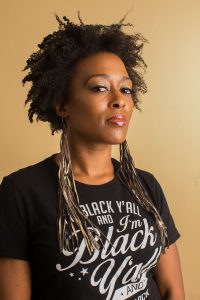
Chatman is a Chicago-based artist who uses theater to conjure hope, justice, freedom, and joy.
Sydney Chatman is a Chicago-based artist who uses theater as her medium to conjure hope, justice, freedom, and joy. Led by ancestral guidance and intergenerational wisdoms; she directs, educates, produces, and writes work that seeks to heal her community, according to her bio. Chatman is the inaugural recipient of the Jeremy O. Harris’ Golden & Ruth Harris Commission and also this year’s Joyce Foundation award winner.
In 2008, she co-founded the Tofu Chitlin’ Circuit, a company that supported underserved Chicago communities through innovative programming. She also founded Fly Black Girl Education & Theatre, a healing and theatrical conservatory for and about Black women and girls. Chatman is the recipient of a Stage Directors and Choreographers Foundation fellowship and the Goodman Theatre Maggio Directing fellowship, among others. She will develop The Messiah in Mink: The Rise and Fall of Prophet Jones through the new $50,000 Harris commission.
“Theatre has the opportunity to use its platform to confront and end systemic racism through the stories we perform by exploring the ritualistic lives of people of color and sharing them on stage,” Chatman said upon winning the award in May. “I am hopeful that by highlighting the humanity in my play and plays like it, we will continue to break down the walls of injustice and build a more equitable and inclusive world.”
Of “No Child…,” she said Monday: “I think it’s effective because it really shows the dexterity of an actor, to be able to transform into each of these characters, and to create a sense of humanity for each of these characters. I think the majority of the challenge is for her, being able to differentiate between those characters.”
Among the roles are five main students, a janitor (who is a narrator for the story), three teachers and a grandmother. “All of them are interacting and having conversations,” the director said. “Our goal was to be clear and distinctive about those conversations, through movement and body language. So each character has their own movement that will indicate this is this particular character, and also with the voice.”
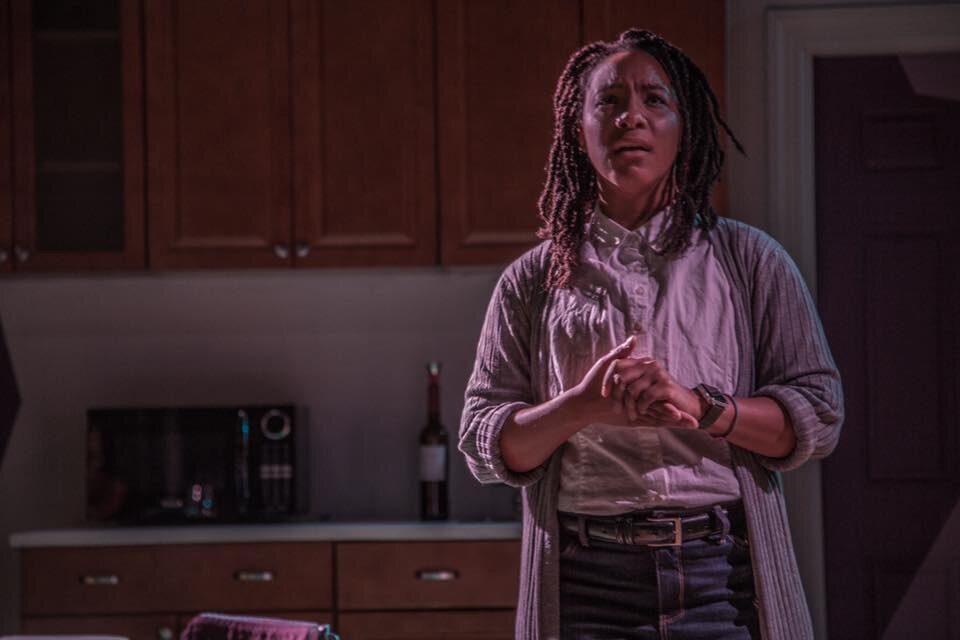
Jalyn Greene is a 28-year-old Detroit native, who’s taught theater in Chicago since graduating from Michigan State University.
Chatman saw Nilaja Sun perform the play in New York in 2013, but never imagined she’d direct it one day.
“What was dynamic was, she’s the only one on stage. What’s nice about plays like this,” Chatman said, “you have to suspend disbelief as an audience member and just imagine, we’re gonna go along for the ride. These characters are so dynamic, you can feel them in the space, even though they’re not talking.”
She’s been teaching theater for 18 years in Chicago, and said she knows teachers and students like in “No Child…”

Sydney Chatman was one of two recipients this year of a $50,000 commission for a new theatrical work from New York Theatre Workshop and playwright Jeremy O. Harris.
“I can relate to the character, to Nilaja Sun’s story very well – being both an artist and a teacher,” Chatman said. The play reveals that teachers aren’t as nearly as well-paid as they should be, she said. “Sometimes, people go into the profession thinking they are going to change the young people they teach. In reality, the young people end up changing them, hopefully for the better.”
“I feel like that’s been my path in education,” she said. “I’ve learned so much more from my students than I could have ever taught them. I’ve learned patience, unconditional love, respect for people’s thinking, feelings, emotions. I learned that I’m really good with younger-aged groups, like pre-K through 5th grade – because they’re still impressionable. They still have that zest for learning, and if I can catch them there, then I know they will be either lifelong patrons of the arts or creating art themselves, and that’s very important to me.”
Chatman liked the way Sun wrote the play, because “the core of the story is really this conversation on how education is presented in America ,” she said. “And how problematic education is and it’s based on resources. It’s based on the demographic and where you live, which is problematic. If you have the money to buy into a private school or a Montessori or someplace where you can have a better education, but the public school systems suffer as a result of that.”
“One of the things that I worked with Jalyn on is finding the humanity of these characters. It’s so easy to fall into a stereotype because they are an amalgamation of all these different students that Nilaja has met over the years,” Chatman said. “What I wanted to present was the humanity of these characters and the growth that they find, as a result of being a part of something, like a theatrical production.” A 2006 New York Times review said that a confident Sun declared to the bored, skeptical students in the play, that “From now on we are nothing but thespians,” which “means actor, citizen, lover of all things great.”
The review said “No Child” is “also fortified with a bracing dose of social criticism; the title refers to the Bush Administration’s ‘No Child Left Behind’ educational policy, about which Ms. Sun is ambivalent at best.”
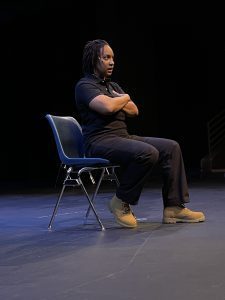
Jalyn Greene in “No Child…” at Mississippi Bend Players.
A 2018 Chicago Tribune review of a new production said: “Most anyone who ever has been a teaching artist in an under-resourced urban school will tell you much the same thing. On rough days, the job feels like an exercise in impotence, given how the students really need a better breakfast, more freedom from gun violence, a fairer distribution of educational resources and more stability from the adults in their homes. On great days, though, the vital importance of arts education seems to cut through all of that, impacting students with the power of ensemble, challenging them to activate their souls and ideas in public and igniting their self-esteem.
“At its core, Nilaja Sun’s wonderful piece of theater, ‘No Child …,” is about that dichotomy,” the review said. “It’s a problem that haunts all of us with connections to the arts, anyone familiar either the insecurity that such an insecure profession engenders, or with the constant defense required against its marginalization. Especially in education.”
A Chicago Reader review of the same production noted the 80-minute show “tells the story of a visiting teaching artist who tries to get a class of uninterested, hostile teenagers at a rundown school in the Bronx to put on a production of British playwright Timberlake Wertenbaker’s 1988 play Our Country’s Good.
“The choice is ironic. Our Country’s Good is about prisoners putting on a play; the students in No Child … feel like prisoners too,” the review said. “Both Wertenbaker’s prisoners and Sun’s students find fulfillment and greater self-worth doing theater.”
Performances of the new MBP production at Augustana are at 7:30 p.m. Thursday to Saturday, and 2 p.m. on Sunday. Tickets are $20; or $15 for students; $17 for faculty and staff and seniors, available HERE or by calling 309-794-7306.











